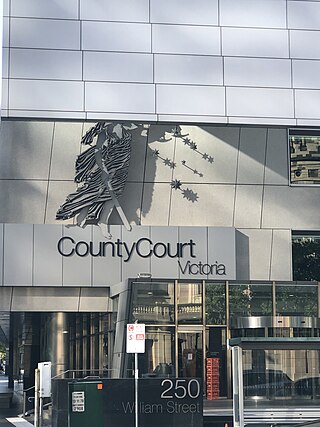Barratry is a legal term that, at common law, described a criminal offense committed by people who are overly officious in instigating or encouraging prosecution of groundless litigation, or who bring repeated or persistent acts of litigation for the purposes of profit or harassment.
A felony is traditionally considered a crime of high seriousness, whereas a misdemeanor is regarded as less serious. The term "felony" originated from English common law to describe an offense that resulted in the confiscation of a convicted person's land and goods, to which additional punishments including capital punishment could be added; other crimes were called misdemeanors. Following conviction of a felony in a court of law, a person may be described as a felon or a convicted felon.

In many common law jurisdictions, an indictable offence is an offence which can only be tried on an indictment after a preliminary hearing to determine whether there is a prima facie case to answer or by a grand jury. A similar concept in the United States is known as a felony, which for federal crimes, also requires an indictment. In Scotland, which is a hybrid common law jurisdiction, the procurator fiscal will commence solemn proceedings for serious crimes to be prosecuted on indictment before a jury.
A misdemeanor is any "lesser" criminal act in some common law legal systems. Misdemeanors are generally punished less severely than more serious felonies, but theoretically more so than administrative infractions and regulatory offences. Typically, misdemeanors are punished with prison time of no longer than one year, monetary fines, or community service.
The Director of Public Prosecutions (DPP) is the office or official charged with the prosecution of criminal offences in several criminal jurisdictions around the world. The title is used mainly in jurisdictions that are or have been members of the Commonwealth of Nations.

In the United States, a district attorney (DA), county attorney, county prosecutor, state's attorney, prosecuting attorney, commonwealth's attorney, state attorney or solicitor is the chief prosecutor or chief law enforcement officer representing a U.S. state in a local government area, typically a county or a group of counties. The exact and scope of the office varies by state. Generally, the prosecutor represents the people of the jurisdiction. With the exception of three states, district attorneys are elected, unlike similar roles in other common law jurisdictions.

Under the law of the United Kingdom, high treason is the crime of disloyalty to the Crown. Offences constituting high treason include plotting the murder of the sovereign; committing adultery with the sovereign's consort, with the sovereign's eldest unmarried daughter, or with the wife of the heir to the throne; levying war against the sovereign and adhering to the sovereign's enemies, giving them aid or comfort; and attempting to undermine the lawfully established line of succession. Several other crimes have historically been categorised as high treason, including counterfeiting money and being a Catholic priest.
A hybrid offence, dual offence, Crown option offence, dual procedure offence, offence triable either way, or wobbler is one of the special class offences in the common law jurisdictions where the case may be prosecuted either summarily or on indictment. In the United States, an alternative misdemeanor/felony offense lists both county jail and state prison as possible punishment, for example, theft. Similarly, a wobblette is a crime that can be charged either as a misdemeanor or an infraction, for example, in California, violating COVID-19 safety precautions.
An accessory is a person who assists, but does not actually participate, in the commission of a crime. The distinction between an accessory and a principal is a question of fact and degree:
Misprision of treason is an offence found in many common law jurisdictions around the world, having been inherited from English law. It is committed by someone who knows a treason is being or is about to be committed but does not report it to a proper authority.
Misprision in English law describes certain kinds of offence. Writers on criminal law usually divide misprision into two kinds: negative and positive.
In the common law legal system, an expungement or expunction proceeding, is a type of lawsuit in which an individual who has been arrested for or convicted of a crime seeks that the records of that earlier process be sealed or destroyed, making the records nonexistent or unavailable to the general public. If successful, the records are said to be "expunged". Black's Law Dictionary defines "expungement of record" as the "Process by which record of criminal conviction is destroyed or sealed from the state or Federal repository." While expungement deals with an underlying criminal record, it is a civil action in which the subject is the petitioner or plaintiff asking a court to declare that the records be expunged.
Compounding a felony was an offence under the common law of England and was classified as a misdemeanour. It consisted of a prosecutor or victim of an offence accepting anything of value under an agreement not to prosecute, or to hamper the prosecution of, a felony. To "compound", in this context, means to come to a settlement or agreement. It is not compounding for the victim to accept an offer to return stolen property, or to make restitution, as long as there is no agreement not to prosecute.

The Criminal Law Act 1967 is an Act of the Parliament of the United Kingdom that made some major changes to English criminal law, as part of wider liberal reforms by the Labour government elected in 1966. Most of it is still in force.
A private prosecution is a criminal proceeding initiated by an individual private citizen or private organisation instead of by a public prosecutor who represents the state. Private prosecutions are allowed in many jurisdictions under common law, but have become less frequent in modern times as most prosecutions are now handled by professional public prosecutors instead of private individuals who retain barristers.
Compounding treason is an offence under the common law of England. It is committed by anyone who agrees for consideration to abstain from prosecuting the offender who has committed treason.
Common law offences are crimes under English criminal law, the related criminal law of some Commonwealth countries, and under some U.S. state laws. They are offences under the common law, developed entirely by the law courts, having no specific basis in statute.
Rape is a statutory offence in England and Wales. The offence is created by section 1 of the Sexual Offences Act 2003:
(1) A person (A) commits an offence if—
(2) Whether a belief is reasonable is to be determined having regard to all the circumstances, including any steps A has taken to ascertain whether B consents.
(3) Sections 75 and 76 apply to an offence under this section.
(4) A person guilty of an offence under this section is liable, on conviction on indictment, to imprisonment for life.

The Fugitive Felon Act, abbreviated FFA, is a United States federal law that criminalizes interstate flight in order to avoid prosecution or giving testimony in state felony proceedings, a crime termed unlawful flight.
The first signs of the modern distinction between criminal and civil proceedings were during the Norman conquest of England in 1066. The earliest criminal trials had very little, if any, settled law to apply. However, the civil delictual law was highly developed and consistent in its operation.






